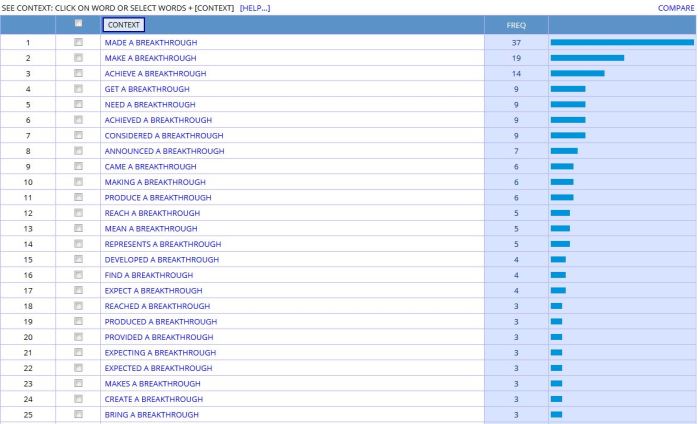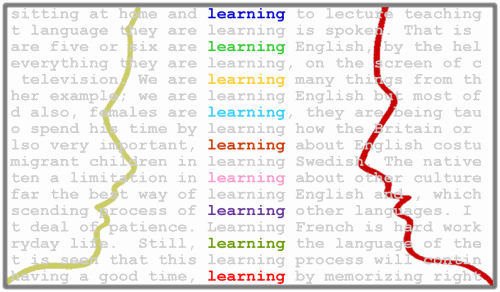What is the first word that comes to mind to fill the blank in this post’s title?
If you’re like me, then it’s “make”. Obviously it doesn’t have to be “make”, but that’s what came to my mind.
We are at the beginning of our Autumn term here, and in chapter 1 of the coursebook there were a few vocabulary/collocation activities. Among them were these patterns:
- _________ progress / a sacrifice / a profit
- _________ your ambition / success / a breakthrough
The students had a bank of words to choose from to fill in the blanks, and this bank included make and achieve. Now, looking at the sets of words, it’s clear that make goes with progress / a sacrifice / a profit, while achieve goes with your ambition / success / a breakthrough.
However, “achieve a breakthrough” sounded a little odd to my ears. Not wrong. Odd. One of the pitfalls of constructing a collocation specifically for course/textbook purposes is that it often ignores other, more ‘natural’ collocations; and in this case actually ignored a verb that was in the exercise: “make”! A look at the top hits for “VERB a breakthrough” in COCA:

So, “made” and “make” are the top hits (by far), and then “achieve” in the 3rd spot. Now, of course “achieve a breakthrough” is fine and acceptable, and clearly attested in the data, but why would one teach that collocation without teaching “make a breakthrough” first (or as well)?
Anyway, I was going to wait a couple weeks before I introduced some corpus activities in class, but I decided this was a fine time to introduce and demonstrate a very basic use of a corpus. The two sections using this particular coursebook are relatively high level, and I was pleased to notice some students quite quickly grasping (through their asking of questions about what they were seeing) that corpora offer information about the target language that they wouldn’t get in a dictionary/grammar, and certainly not in their coursebook.

hi Michael
the book was probably was using strength of association between verb & a breathrough rather than raw frequency i.e if you list COCA results by “Relevance” i.e. MI scores you get achieve a breakthrough with highest score
ta
mura
LikeLiked by 1 person
Hi Michael (and Mura),
I like this idea about raw frequency, and that also the MI score shows ‘achieve’ has strong association with breakthrough. I was wondering if the Mi in this case would be bidirectional? That is, ‘achieve’ associates with ‘a breakthrough’ on the right very highly, but how about ‘a breakthrough’s strength of association with ‘achieve’ to the left?
Anyway, interesting ideas to bear in mind for a TOEFL course I am teaching on next week.
Marc
LikeLiked by 1 person
MI scores in COCA
[achieve] a breakthrough –> 9.08
achieve a [breakthrough] –> 8.54
Not too far away
LikeLiked by 1 person
Cheers Michael. An interesting analysis tool that I haven’t really used much – I normally use SketchEngine or AntConc.
LikeLike
i think the MI score can be negative i.e. two items “repulse” rather than “attract” each other;
trying your search example Marc COCA gives “came” as highest MI but score much lower than for “achieve”
LikeLiked by 2 people
Cheers Mura, and sorry for invading the comments, Michael.
LikeLiked by 1 person
Invade as much as you like 🙂
LikeLiked by 1 person
Thanks Marc and Mura for your comments, and for pointing out the MI scores and other ways to think about the direction of the association. Sorry for the loooonnnggg comment below. Could probably be a new post lol
As to whether the book was basing decisions on a strength of association test….could be, but I doubt it. But even if they were using a metric like that, I’d still take issue with it. “Make” is so versatile and is used in so many ways that ‘of course’ it has a lower association strength, but in this matter sheer raw frequency would better inform how the concept is expressed (“breakthrough” was a new word to most of the students, the most common pattern would be most useful in this case, I think).
Part of the reason I doubt they were using a strength of association metric is that, for example, if they were, “make a profit” has a lower MI score than both “earn a profit” and “turn a profit” (at least in COCA) which convey the same/similar idea, but they chose to include the more common “make a profit” over those alternatives (in the context of the chapter introducing “earn” and some of its collocations would actually have been great, but that’s a different matter). It would be a rather inconsistent, selective use of strength of association, one meant to shoe-horn in a predetermined pattern imo.
If they were ok teaching “make a profit”, then I think “make a breakthrough” should be in there as well (tbh I don’t know if the coursebook uses any corpus data to inform its contents; I’ll check the publisher’s website). I guess I’m not really complaining about the inclusion of “achieve a breakthrough”, but rather about the ignoring of “make a breakthrough”. The real issue is that the coursebook presents only one VP for the NP.
LikeLiked by 1 person
hi all
for “patterns” stringnet could be worth exploring with students? i think an issue here is how it is easy for coursebooks to use fill in the gap exercises and so the nature of such exercises constrains the amount of language info that can be explored?
ging back to collocations, conceptualising it as in this graph may be helpful – to us teachers that is than students : ) https://magic.piktochart.com/output/16856740-identify_collocations
ta
mura
LikeLiked by 3 people
I feel like I have seen that before, but totally forgot about it.
Thanks very much for making/sharing it!
LikeLiked by 2 people
This would/should also apply to creating vocab/collocation/chunk exercises
http://cass.lancs.ac.uk/?p=2318
LikeLiked by 3 people
[…] Yesterday I wrote that the expression “achieve a breakthrough” sounded odd to me, and I much prefer the more frequent “make a breakthrough”. […]
LikeLiked by 2 people